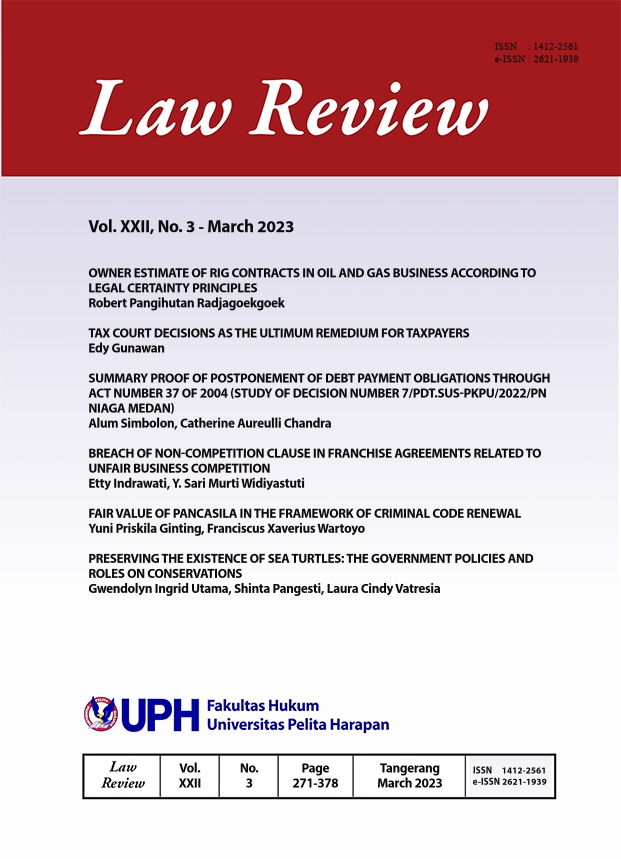Breach of Non-Competition Clause in Franchise Agreements Related to Unfair Business Competition
DOI:
https://doi.org/10.19166/lr.v22i3.6537Λέξεις-κλειδιά:
Non-Competition Clause, Franchise Agreement, Unfair Business CompetitionΠερίληψη
The non-competition clause in the franchise agreement is the franchisee's commitment not to run a similar business or potentially become a competitor to the franchisor's business within a certain period as a form of protection of the franchisor's intellectual property rights and appreciation for the transfer of know-how that the franchisor has carried out in the form of knowledge, concept, and experience to the franchisee. There are two purposes of this article. First is to explore and analyze cases of breach of the non-competition clause in franchise agreements in Indonesia carried out by franchisees can be qualified or not as a form of unfair business competition as regulated in Article 1 number 6 Law Number 5 of 1999 concerning Prohibition of Monopolistic Practices and Unfair Business Competition. Second is to investigate the legal remedies taken by the franchisor against the franchisee who breaks the non-competition clause in the franchise agreement. This research project uses qualitative method. This research involved respondents and informants from business owners of national franchisors. There are two results of this study. First, breaking non-competition clauses in franchise agreements, which have been read before signing, can qualify as unfair business competition. Second, if a franchisee or former franchisee breaks a non-competition clause, it is necessary to communicate with the violating party first before giving a summons/warning. Moreover, if it is still not heeded, the franchisor can file a lawsuit in court or submit a complaint to The Indonesia Competition Commission (KPPU).
Αναφορές
Laws and Regulations
Law Number 5 Year 1999 concerning Prohibition of Monopolistic Practices and Unfair Business Competition.
Government Regulation Number 42 of 2007 concerning Franchising.
Minister of Trade Regulation Number 71 of 2019 concerning Franchise Implementation.
The Decision of the Commission for the Supervision of Business Competition Number: 57/KPPU/Kep/III/2009 concerning Guidelines for the Implementation of the Provisions of Article 50 letter b of Law Number 5 of 1999 concerning Prohibition of Monopolistic Practices and Unfair Business Competition against Agreements Related to Franchise.
The World Franchise Council's Principles of Ethics.
Books
Maheka, Arya. Master Draft Perjanjian Waralaba Apotek K-24. Yogyakarta: TP, 2013.
Margono, Suyud. Hukum Anti Monopoli. Jakarta: Sinar Grafika, 2013.
Sutedi, Adrian. Hukum Waralaba. Bogor: Penerbit Ghalia Indonesia, 2008.
Widjaja, Gunawan. Lisensi atau Waralaba: Suatu Panduan Praktis. Jakarta: PT RajaGrafindo Persada, 2002.
Journal Articles
Alon, Ilan. "Global franchising and development in emerging and transitioning markets." Journal of Macromarketing 24, no. 2 (2004): 156-67. https://doi.org/10.1177/0276146704269320.
Angelita, Zhanniza Elrian, and I Made Tjatrayasa. “Syarat-Syarat Pembentukan Perjanjian Waralaba Berdasarkan Peraturan Pemerintah Nomor 42 Tahun 2007 tentang Waralaba,” Kertha Semaya 3, no. 1 (January 2015): 1-5. https://ojs.unud.ac.id/index.php/kerthasemaya/article/view/11903.
Brickley, James A. "Royalty rates and upfront fees in share contracts: evidence from franchising." Journal of Law, Economics, and Organization 18, no. 2 (2002): 511-35. https://doi.org/10.1093/jleo/18.2.511.
Chandra, Alston, and Y. Sari Murti Widiyastuti. “Peran Komisi Pengawas Persaingan Usaha (KPPU) dalam Mendorong Iklim Persaingan Usaha yang Sehat di Sektor Perunggasan.” Justitia Et Pax 33, no. 1 (June 2017): 1-11. https://doi.org/10.24002/jep.v33i1.1416.
Gillis, William E., and James G. Combs. "Franchisor strategy and firm performance: Making the most of strategic resource investments." Business Horizons 52, no. 6 (2009): 553-61. https://doi.org/10.1016/j.bushor.2009.07.001.
Rahma, Etty Septiana, and Etty Susilowati. “Kedudukan Tidak Seimbang pada Perjanjian Waralaba berkaitan dengan Pemenuhan Kondisi Wanprestasi.” Law Reform 10, no. 1 (October 2014): 16-30. https://doi.org/10.14710/lr.v10i1.12454.
Slamet, Sri Redjeki. "Waralaba (franchise) di Indonesia." Lex Jurnalica 8, no. 2 (2011): 127-39. https://ejurnal.esaunggul.ac.id/index.php/Lex/article/view/325.
Personal Communications
Interview with Anang Sukandar and Veronica Linda, Chair of the Indonesian Franchise Association. July 07, 2022.
Interview with Andrew Nugroho, Director of PT Top Food Indonesia, Es Teller Franchise 77. June 07, 2022.
Interview with Chandra Setiawan (Commissioner) and Ima Damayanti (Head of Legal Bureau), Indonesia Competition Commission (KPPU). August 01, 2022.
Interview with Eko Pratomo, Director of PT Melia Pilar Utama, Franchisor of Melia Laundry & Drycleaning. June 09, 2022.
Interview with Gideon Hartono, Director of PT K-24 Indonesia, Franchisor for K-24 Pharmacy. June 17, 2022.
Interview with Grace Amelia Senggu, 2022, Legal Consultant. July 08, 2022.
Interview with Hendy Setiono, Director of PT BABA RAFI INDONESIA, Franchisor of Kebab Turki Baba Rafi. June 28, 2022.
Interview with Utamiwati (General Manager) and Pery Andiani (Business Development Manager) PT Cantika Puspa Pesona, Franchisor of Martha Tilaar Salon and Day Spa. June 28, 2022.
Interview with Utomo Njoto, Franchise Consultant. July 07, 2022.
Λήψεις
Δημοσιευμένα
Πώς να δημιουργήσετε Αναφορές
Τεύχος
Ενότητα
Άδεια
Authors who publish with this journal agree to the following terms:
1) Authors retain copyright and grant the journal right of first publication with the work simultaneously licensed under a Creative Commons Attribution License (CC-BY-SA 4.0) that allows others to share the work with an acknowledgement of the work's authorship and initial publication in this journal.
2) Authors are able to enter into separate, additional contractual arrangements for the non-exclusive distribution of the journal's published version of the work (e.g., post it to an institutional repository or publish it in a book), with an acknowledgement of its initial publication in this journal.
3) Authors are permitted and encouraged to post their work online (e.g., in institutional repositories or on their website). The final published PDF should be used and bibliographic details that credit the publication in this journal should be included.





